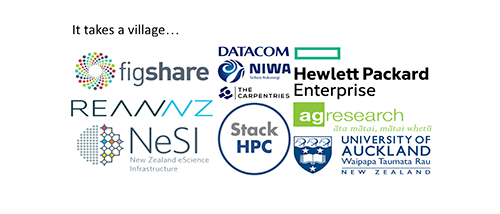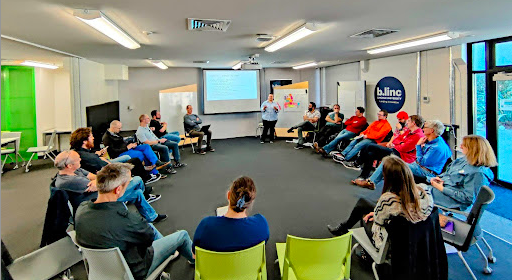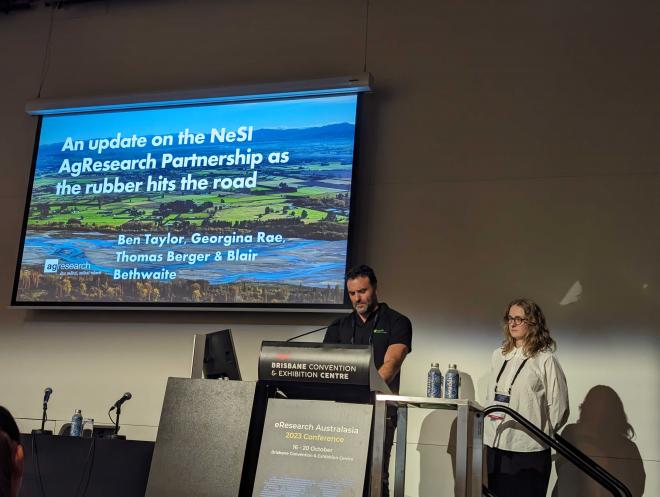Reflections on designing and delivering a future-focused eResearch Platform
It has been two years since AgResearch and NeSI signed a Memorandum of Understanding committing to design and deliver a future-focused eResearch Platform together.
This partnership emerged out of a culmination of:
- Research sector reviews emphasising the need for greater collaboration
- Local needs to replace legacy infrastructure
- Local needs to mitigate risks around having only a few local experts
- A national need to build scale
It also takes on broader aspirations for AgResearch eResearch capability, incorporating training, research data management & data governance, and communities of practice.
Two years on, we now have users consuming the new services, but it has taken a long time and there is still a lot to do to fully leverage the power of the new technology and implement our initial designs.
Below are some reflections on what we've accomplished, the wins along the way, and the lessons learned that we're taking into the next phases of this collaboration.
The platform: An overview
The AgResearch eResearch Infrastructure (eRI) platform aims to eventually underpin all of AgResearch's science. This all-in-one environment brings together expertise, computing and data, research networks, instruments at the institutional edge, and scientific pipelines and workflows to harness the power of the platform as a super-facility for research.
The collaboration model behind this platform shares and fosters expertise across both organisations. Both NeSI and AgResearch are discovering and learning about how best to support and develop a rich national eResearch ecosystem. Overall, the platform forms mutual support networks for platform operations, user support, and establishing critical mass through training and community-building.
All of our work together has been driven around designing a platform that:
- develops efficiencies for researchers
- improves researchers’ ability to collaborate nationally & internationally
- supports open science, FAIR and CARE of research data, Māori data sovereignty
- builds capability and a data savvy workforce

Reflection # 1 - Stakeholder management
With multiple people and perspectives to carry along on this journey, it's important to constantly review and evolve the communications and engagement plan. Lessons learned on this so far:
- Outreach needs to include a mix of users, senior stakeholders.
- Manage expectations (without timelines).
- Ensure people know how to raise concerns with the project.

Reflection #2 - Keep working on the team
Two organisations, two working cultures, both with aims to support researchers with new services on new infrastructure while building national scale and mitigating risk for AgResearch. Successful teams aren't built overnight, they require effort and support. Lessons learned on this so far:
- Engage early. For significant changes in ways of working, you bring people in late at your peril. Practice deliberate on-boarding.
- Put effort into transparency / communications / visibility – but beware of tool fatigue.
- Shared purpose – everyone needs to know (and buy into) where we are heading. This is not a one-time / one-off conversation. Continuously reconnect with the "why" / the purpose / the vision.
- Dedicate time to bring people together in person.
- Keep the energy up and positive, especially if things get tricky / challenges arise.

Reflection #3 - Research data-related change is hard
We knew a project of this scale and scope would be challenging, yet we still underestimated how and where hurdles might be encountered. Lessons learned on this so far:
- Migrating all of a research organisation's research data takes time.
- It's harder when data-intensive research has to continue throughout the transition process.
- Research Data Management practice opportunities are tempered by timelines, staff availability, and timing key communications to harness energy.
Next steps: Continue building
As we mature this partnership, we are learning from our reflections and continually refining and improving our services.
This work has also exemplified how partnerships are built around more than just the infrastructure. People and relationships have been instrumental as we've brought researcher needs to the fore, leveraged existing skills within our teams, and built new capabilities across our organisations.
Looking ahead, we're excited about how our platform is adapting to change in the sector and how we can work collaboratively to empower researchers and enable research.
Do you have an example of how NeSI platforms or support advanced your research? We’re always looking for projects to feature as a case study.
Get in touch by emailing support@nesi.org.nz.







